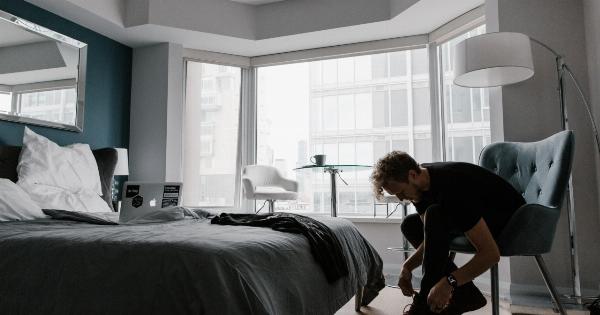We have all experienced the struggle of waking up in the morning to the sound of our alarm clocks. The temptation to hit the snooze button and steal a few more minutes of precious sleep can be overwhelming.
But have you ever wondered about the psychology behind snoozing? Why do we find it so difficult to resist the allure of those extra moments of slumber? In this article, we delve into the fascinating world of snoozing and explore the various psychological factors that come into play.
The Science of Sleep
Before we dive into the psychology of snoozing, let’s first understand the science behind sleep. Sleep is a vital physiological process that allows our bodies and minds to recharge and rejuvenate.
It is during sleep that our brain consolidates memories, repairs tissues, and regulates various bodily functions. The quality and duration of our sleep can significantly impact our overall well-being and cognitive function.
The Pleasure of Comfort
One of the primary reasons we find it so hard to resist the snooze button is the pleasure associated with staying in bed. Our beds provide a warm and comfortable space, offering a sense of security and relaxation.
When the alarm goes off, we face a conflict between the immediate pleasure of remaining in bed and the long-term benefits of waking up promptly.
The Power of Habits
Human beings are creatures of habit, and our morning routines play a crucial role in setting the tone for the rest of the day. Snoozing can become ingrained in our daily rituals, creating a habitual behavior that is challenging to break.
When we continually snooze, it becomes more challenging to develop a consistent sleep-wake schedule, leading to a disrupted sleep pattern and a groggy start to the day.
The Fear of the Unknown
Another psychological factor that influences our snoozing habits is the fear of the unknown. The period between the alarm going off and getting out of bed can be seen as a transitional phase from the comfort of sleep to facing the challenges of the day.
This transition can be anxiety-inducing for some individuals, causing them to seek refuge in the snooze button. By hitting snooze, we momentarily delay facing the tasks, responsibilities, or uncertainties that await us.
The Instant Gratification Trap
Humans are wired to seek immediate gratification, even when it may not be in their long-term best interests. Hitting the snooze button provides an instant sense of relief and the illusion of gaining a few more minutes of sleep.
However, this instant gratification comes at a cost. By snoozing, we disrupt the natural sleep cycle, leading to fragmented and less restorative sleep, ultimately leaving us feeling more tired and groggy.
The Role of Sleep Debt
Chronic sleep deprivation and accumulating sleep debt can also contribute to our snoozing tendencies. Lack of adequate sleep during the night can result in a higher sleep debt, leading to increased daytime sleepiness.
The exhaustion and fatigue experienced due to sleep debt often make it harder to resist the snooze button in the morning.
The Impact on Productivity
Constant snoozing can have a detrimental effect on our productivity levels throughout the day. Each time we hit snooze, we interrupt the recovery process of our body and mind, causing a state of inertia that can persist even after we finally wake up.
This sluggish state can hinder our ability to concentrate, solve problems, and perform at our best, resulting in decreased productivity and efficiency.
Strategies to Tame the Snooze Button
While it may seem challenging to break the snoozing habit, there are several strategies that can help you resist the allure of that tempting button:.
- Set a consistent sleep schedule: Establishing a regular sleep routine can regulate your body’s internal clock, making it easier to wake up in the morning without hitting snooze.
- Place your alarm across the room: Moving your alarm clock away from your bed forces you to physically get out of bed to turn it off, making it less likely for you to snooze.
- Create a morning routine: Developing a morning routine that includes activities you enjoy can give you an incentive to get out of bed promptly.
- Avoid screen time before bed: The blue light emitted by electronic devices can disrupt your sleep cycle. Establish a device-free wind-down routine to signal to your body that it’s time to sleep.
- Use an alarm clock with a gradual wake-up feature: Some alarm clocks simulate a sunrise by gradually increasing the light, mimicking a natural awakening and making it easier to wake up.
- Accountability buddy: Share your goal of avoiding snoozing with a friend or family member who can help keep you accountable and provide support.
- Reward yourself: Set up a small reward system for each morning you resist hitting snooze. It could be something as simple as treating yourself to your favorite coffee or a few extra minutes of leisure time.
- Adjust your sleep environment: Ensure your bedroom is conducive to good sleep by optimizing factors such as temperature, noise, and comfort.
- Manage stress: Practice stress management techniques, such as meditation or deep breathing exercises, to reduce anxiety associated with facing the day.
- Seek professional help: If excessive snoozing and fatigue persist despite your efforts, it may be beneficial to consult a healthcare professional for further evaluation and guidance.
In Conclusion
Understanding the psychology behind snoozing can help us gain insights into our own behaviors and provide strategies to break the habit.
By acknowledging the pleasure of comfort, the power of habits, the fear of the unknown, and the allure of instant gratification, we can take proactive steps to resist the snooze button. Remember, resisting the temptation to snooze can lead to improved productivity, enhanced well-being, and a more energized start to your day.



























